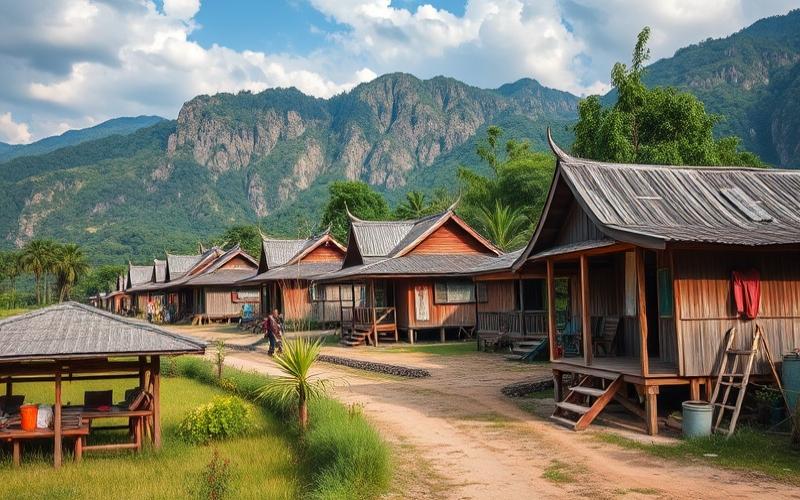
 Published on and written by Cyril Jarnias
Published on and written by Cyril Jarnias
Thailand, with its pristine beaches, rich culture, and affordable cost of living, is attracting more and more foreign investors seeking a sunny getaway or lucrative real estate opportunities. However, negotiating property purchases in this Southeast Asian country can prove challenging for the uninitiated. Between local market specifics, complex regulations, and cultural differences, proper preparation is crucial to successfully complete your transaction and achieve substantial savings. In this article, we’ll reveal winning strategies, pitfalls to avoid, and tips to become a true expert in Thai real estate negotiation.
The Thai Real Estate Market: A Unique Playing Field to Master
Before entering any negotiation, it’s essential to understand the particularities of the Thai real estate market. This dynamic market presents interesting opportunities, but also specific challenges that need to be properly understood.
An Expanding Market
For several years, the Thai real estate market has experienced sustained growth, particularly thanks to the influx of foreign investors. The main attractive areas are Bangkok, the capital, as well as popular beach resorts like Phuket, Pattaya, or Koh Samui. This increasing demand has led to price increases in certain regions, but opportunities remain for savvy buyers.
Restrictions for Foreigners
It’s important to note that Thai legislation imposes restrictions on foreigners wishing to acquire real estate. Indeed, non-Thai nationals cannot directly own land but can purchase condominium units, provided that the total number of units owned by foreigners does not exceed 49% of the building’s total area. These legal constraints necessarily influence purchasing and negotiation strategies.
A Seasonally Influenced Market
The Thai real estate market is also marked by strong seasonality. The high tourist season, typically from November to April, often corresponds to a period of high demand and rising prices. Conversely, the low season can offer interesting opportunities for buyers ready to negotiate.
Good to Know:
Thorough understanding of the Thai real estate market is key to successful negotiations. Take time to study local trends, average prices, and specificities of each region before diving in.
The Secret Weapons of Real Estate Negotiators in Thailand
Now that you have an overview of the market, it’s time to arm yourself with the best strategies to effectively negotiate your property purchase in Thailand.
Do Your Homework
- Know the average market prices in your area of interest
- Study recent sales history for similar properties
- Understand local market trends (rising, falling, stable)
- Identify factors that could influence property value (transportation proximity, future developments, etc.)
Cultivate Patience
In Thailand, the concept of time can differ from Western countries. Negotiations may take time, and it’s important not to appear too rushed. Patience is often rewarded, as it can help you secure better terms or more advantageous prices.
Master the Art of “Greng Jai”
The concept of “greng jai,” which can be translated as “consideration for others’ feelings,” is central to Thai culture. In negotiation contexts, this means avoiding direct confrontations and favoring a diplomatic, respectful approach. Always remain polite and avoid causing loss of face for yourself or your counterpart.
Use a Local Real Estate Agent
Engaging a local real estate agent can be a major advantage. Not only will they have perfect market knowledge, but they can also help overcome language and cultural barriers. Additionally, a good agent often has access to off-market listings.
Be Prepared to Make Concessions
Negotiation is an art of compromise. Identify in advance which points you’re willing to concede and which are non-negotiable. This flexibility can help break deadlocks and reach agreements satisfactory to all parties.
Good to Know:
Negotiation in Thailand is often more subtle and indirect than in Western countries. Learn to read between the lines and interpret nonverbal signals to maximize your success chances.
Pitfalls to Avoid: Don’t Fall Into the Trap!
Even armed with the best strategies, there are pitfalls to absolutely avoid during your Thai real estate negotiations. Here are the most common mistakes and how to circumvent them.
Not Verifying Property Legality
One of the gravest errors is failing to conduct necessary legal checks before purchase. Ensure the seller is the legal property owner and all required permits have been obtained, especially for properties under construction. Don’t hesitate to engage a specialized lawyer to assist with these procedures.
Underestimating Additional Costs
Many buyers focus solely on purchase price and forget to account for additional fees. In Thailand, these may include transfer taxes, condominium fees, insurance, and sometimes specific fees for foreign buyers. Incorporate all these costs into your budget to avoid unpleasant surprises.
Neglecting Land Lease Importance
For foreigners purchasing houses (since they cannot directly own land), leasehold duration and conditions are crucial. Ensure you fully understand lease terms, duration, renewal conditions, and any restrictions.
Rushing Due to Enthusiasm
Thailand can be seductive, and it’s easy to get carried away by enthusiasm. Resist the urge to close quickly and take time to carefully consider your decision. Visiting during rainy season can give you a different perspective on properties you’re considering.
Ignoring Cultural Specificities
Don’t underestimate the importance of cultural differences in negotiation processes. What might be considered normal negotiation tactics in your home country could be perceived as offensive in Thailand. Always remain respectful and attentive to cultural subtleties.
Good to Know:
Due diligence is crucial when purchasing property in Thailand. Don’t hesitate to invest in professional advice (lawyer, accountant, real estate expert) to ensure your investment is safe and legally compliant.
The Art of Closing: Finalizing Your Purchase with Flair
Once you’ve successfully navigated negotiation complexities, it’s time to close your purchase. This final stage is just as crucial as previous ones and deserves your full attention.
Get Everything in Writing
In Thailand, as everywhere, having all agreements in writing is essential. Ensure all transaction details, including price, payment conditions, inclusions and exclusions, are clearly stipulated in a written contract. If possible, have the contract translated into your native language to ensure full understanding of all terms.
Secure Your Payment
Payment security is paramount. Avoid cash payments and favor secure bank transfers. In Thailand, it’s common to pay a deposit upon signing the preliminary contract, but ensure this deposit is protected, for example by placing it in an escrow account.
Conduct a Final Inspection
Before finalizing purchase, conduct a thorough property inspection. Verify that all agreed repairs or modifications have been completed and the property is in promised condition. For new or under-construction properties, ensure everything conforms to plans and specifications.
Prepare for Post-Purchase
Purchase completion is just the beginning of your Thai real estate adventure. Anticipate post-purchase procedures like utility account setup, home insurance establishment, or property manager hiring if you don’t reside on-site.
Good to Know:
Closing a real estate purchase in Thailand may take longer than in your home country. Remain patient and don’t let yourself be rushed into signing documents you don’t fully understand.
In conclusion, negotiating property purchases in Thailand might seem intimidating initially, but with proper preparation, thorough understanding of the local market, and respectful approach to cultural specificities, you can achieve excellent deals. Remember that each negotiation is unique and flexibility is often key to success.
Whether you’re seeking a seaside vacation home, a Bangkok pied-à-terre, or promising rental investment, Thailand offers numerous opportunities. By following the detailed advice and strategies in this article, you’ll be well-equipped to navigate sometimes turbulent Thai real estate waters and realize your acquisition dreams in the Land of Smiles.
Disclaimer: The information provided on this website is for informational purposes only and does not constitute financial, legal, or professional advice. We encourage you to consult qualified experts before making any investment, real estate, or expatriation decisions. Although we strive to maintain up-to-date and accurate information, we do not guarantee the completeness, accuracy, or timeliness of the proposed content. As investment and expatriation involve risks, we disclaim any liability for potential losses or damages arising from the use of this site. Your use of this site confirms your acceptance of these terms and your understanding of the associated risks.



















































